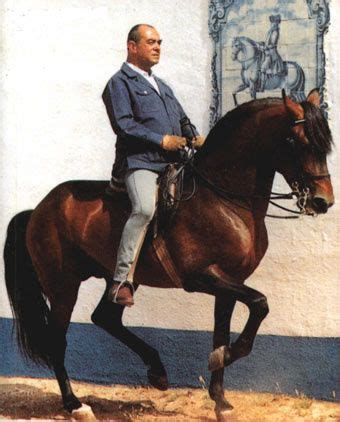A Quote by Prince Philip
A horse which stops dead just before a jump and thus propels its rider into a graceful arc provides a splendid excuse for general merriment.
Related Quotes
One might compare the relation of the ego to the id with that between a rider and his horse. The horse provides the locomotor energy, and the rider has the prerogative of determining the goal and of guiding the movements of his powerful mount towards it. But all too often in the relations between the ego and the id we find a picture of the less ideal situation in which the rider is obliged to guide his horse in the direction in which it itself wants to go.
[There, in War Horse] very little CGI. What happened there - because the horse was running very close to the trench, we had a rider. So in few instances, we had a rider dressed in a green suit. The rider would guide the horse through the frame, and through CGI [we removed] the rider. But that's about it.
The functional importance of the ego is manifested in the fact that normally control over the approaches to motility devolves upon it. Thus in its relation to the id it is like a man on horse back, who has to hold in check the superior strength of the horse; with this difference, that the rider tries to do so with his own strength while the ego uses borrowed forces.
When the clock stops on a life, all things emanating from it become precious, finite, and cordoned off for preservation. Each aspect of the dead person is removed from the flux of the everyday, which, of course, is where we miss him most. The quarantine around death makes it feel unlucky and wrong--a freakish incursion--and the dead, thus quarantined, come to seem more dead than they already are.... Borrowing from the dead is a way of keeping them engaged in life's daily transactions--in other words, alive.
Dakota tribal wisdom says that when you're on a dead horse, the best strategy is to dismount. Of course, there are other strategies. You can change riders. You can get a committee to study the dead horse. You can benchmark how other companies ride dead horses. You can declare that it's cheaper to feed a dead horse. You can harness several dead horses together. But after you've tried all these things, you're still going to have to dismount.
Anytime you are with a horse, no matter if you are a daily rider or one who just gets a chance to ride to the mailbox, you are interacting with your horse. It is all about the quality of the communication, not the quantity. Doing something right once in a while will far surpass anything done wrong more often.
Tides of History provides a splendid prism through which we may view the wider world of Victorian science. . . . Historians of science will have cause to heap praise on this book, but so too will the non-specialists. The author's splendid writing style, at times appropriately Puckish, makes this work an accessible and enjoyable read.





































